
10 Nonfiction Books by Trans, Nonbinary, and Drag Performer Authors to Educate and Entertain
Right now, hate against transgender people, gender-nonconforming people, and drag queens, kings, and performers is bolder and stronger than ever. The TERF movement and the push to ban drag and limit the life-saving care that young trans and gender-nonconforming teens need is an attack on all of our rights to privacy and bodily autonomy.
This is intimately linked to the push to attack our reproductive rights, our access to healthcare, insidious kinds of racism, and much more, because it is all about controlling unruly bodies that don’t fit in a regimented white supremacist and patriarchal system. This Pride Month, it’s important that we all stand by our trans, gender-nonconforming, nonbinary, and drag performer friends, allies, and neighbors in order to protect our most vulnerable populations and not let them shut down an intersectional movement that challenges their power.
One of the very best ways to do that is to educate yourself and put yourself in a good place to educate others. We can educate and fight with family members and friends so that our nonconforming community has to do so that little bit less. By educating ourselves, we become better allies and better protestors. And books, naturally, are one of the best ways to educate ourselves. So I’ve gathered here 10 books by trans, gender-nonconforming, and drag-performer authors to help us all learn, open ourselves, and be ready for the fight that’s to come.
Note: I want to acknowledge here that drag performance and being trans are not the same thing. I am combining trans, nonbinary, and gender-nonconforming authors with drag performer authors both because there is some overlap (some drag performers are also trans) and because the threat against gender-nonconformity is targeting both drag performers and trans people directly right now across the United States.

The T Guide: Our Trans Experiences and a Celebration of Gender Expression―Man, Woman, Nonbinary, and Beyond by Gigi Gorgeous and Gottmik (aka Kade Gottlieb)
This new book from Drag Race star and trans man Gottmik (AKA Kade Gottlieb) and YouTube sensation and trans woman Gigi Gorgeous digs into all of the ins and outs of being trans and what young trans people (and their parents, and allies) need to know. They talk openly and boldly about their experiences, share their cautionary tales for young gender-nonconforming folk to help them keep themselves safe, and tell their own gender dysphoria and euphoria stories. They also share small columns from a long list of contributors, including Drag Race winner and trans icon Sasha Colby, singer Adam Lambert, and even the authors’ parents, to give a more varied and complex look at the experience of gender-nonconforming people. This is a must-have for any ally, giving a crucial education on trans life, but more importantly, is a guide for young people on how to stay safe and have hope.

All Boys Aren’t Blue by George M. Johnson
Johnson’s memoir holds a dubious accolade: it is one of the top five most banned books in the country. That’s because of Johnson’s frank memories growing up as a Black queer boy in New Jersey and later in Virginia, including bullying, coming of age, discovering a sex life, and more. It is a YA memoir about a young Black queer boy, and covers everything from family to toxic masculinity, with young people clearly in mind as its target audience. Johnson, who is nonbinary, pours their heart onto the page, and their memoir has had huge impact on the thousands of readers who have dug into it so far. I encourage both young readers and adult readers to check this book out of their local library and dig in.
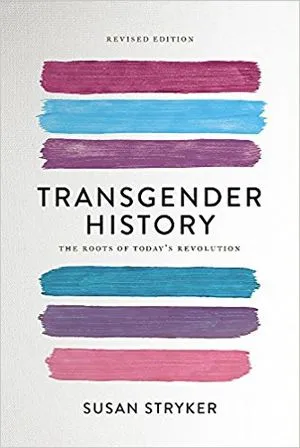
Transgender History: The Roots of Today’s Revolution by Susan Stryker
Stryker covers trans history in the United States starting in the mid-20th century, writing about people from Virginia Prince to Reed Erickson; discussing how trans activism fit or didn’t fit into queer liberation and feminism movements over the decades; and giving a foundation for some basic trans issues, including its medicalization and legality. This book isn’t perfect — it’s outdated at times — but still exposed me not only to a lot that I didn’t know about trans activism and history in the United States while also showing the parallels and foundations between today’s TERF anti-trans movement and a similar backlash in the 1970s.

The Big Reveal: An Illustrated Manifesto of Drag by Sasha Velour
RuPaul’s Drag Race winner Sasha Velour’s last book, Velour, was a gorgeous compilation of zines about drag and gender. Their newest is a scrapbook-style memoir about how Sasha came to drag. They compile stories of their mother and other women who raised them, what it means to be an artist, queer history, and much more to try and dig into drag as an art form with a special personal flavor. “Drag embodies the queer possibility that exists within each of us,” Velour writes, “the infinite ways in which gender, good taste, and art can be lived.” This is a great read for fans of Drag Race and people who want to dig into drag as an art form.

Black on Both Sides: A Racial History of Trans Identity by C. Riley Snorton
This book has won all the awards, and for good reason. Snorton writes about several African American trans narratives, exposing how forgotten they appear to be or how erased they have been from the narrative, and connects race and trans issues in a web that can’t be picked apart. Using history, literature, culture, and more, Snorton unpacks how slavery and the careful production of racialized gender connect to the formation of trans worlds and the “emergence” of trans lives. It’s important to note that this isn’t a history, but an academic text that won’t read easily for many. But I’d say it’s worth it if you can take the time to dig into this winner of the Lambda Literary Award for Transgender Nonfiction and the Sylvia Rivera Award in Transgender Studies from the Center for Lesbian and Gay Studies, among other accolades.
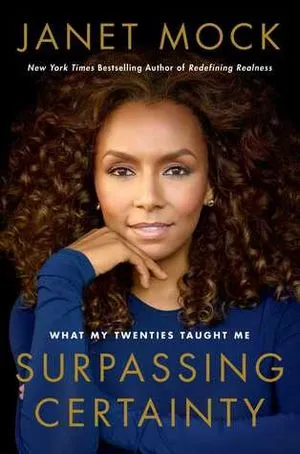
Surpassing Certainty: What My Twenties Taught Me by Janet Mock
When I saw Mock speak in Chicago in 2017, she said that it was actually the book that she wanted to write first, but she knew that publishers wanted her “transition memoir”, Redefining Realness: My Path to Womanhood, Identity, Love, and So Much More. While that book is also a treasure, I recommend this one, which delves into Mock’s messy 20s, about the period when she was first presenting herself as a woman in the public, and her fears and worries, disclosure and desire. Mock really wanted this book to be about what it’s like to navigate the world with a trans body, to be a road map about what it’s like to live your life trying to assimilate and just be a woman in our world.
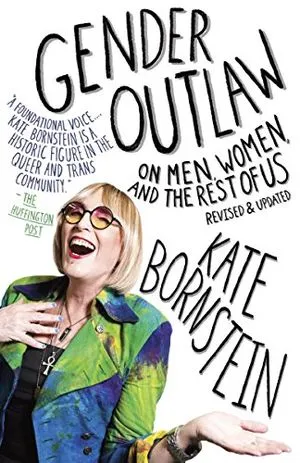
Gender Outlaw: On Men, Women, and the Rest of Us by Kate Bornstein
This book is foundational in queer nonfiction. Written when “nonbinary” hadn’t yet come into standard usage, Bornstein digs deep into the understanding of gender-nonconformism, about how for too long, they thought that the only way to not be a man was to be a woman, but how they see themselves somewhere in between; they dig into gender and sex with a lot of wit and sarcasm in this deeply queer book that’s made Bornstein an icon in the community.
Please remember in your read of this book that it was foundational on its publication in 1995, and so might feel outdated in parts, but that Bornstein’s work was incredibly radical at the time.
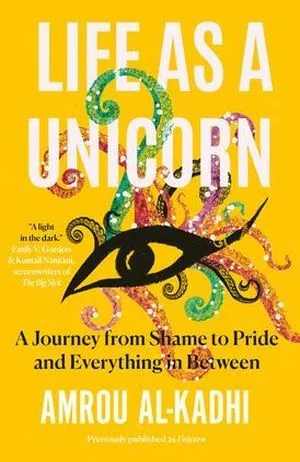
Life as a Unicorn: A Journey from Shame to Pride and Everything in Between by Amrou al-Kadhi
Amrou grew up in an Iraqi Muslim conservative family, so discovering that he was gay was anything but easy. From his family to bullies at Eton, Amrou unspools an experience of a gender-nonconforming, queer person who faces homophobia, Islamophobia, mental health struggles, and much more in his path to become Glamrou, a queer drag queen with so much confidence, and founder of drag troupe Denim. It’s an excellent memoir about what queer people often face growing up in hostile, hateful environments, and how much it takes to survive those periods and make it to an elusive “other side.”
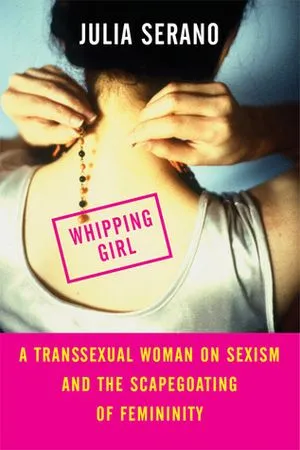
Whipping Girl: A Transsexual Woman on Sexism and the Scapegoating of Femininity by Julia Serano
Too often in recent years, TERFs, people who claim to be feminists defending the rights of women by excluding trans women, have gained ground and power. Serano’s work is crucial in countering many of the claims TERFs make about femininity and womanhood. As she tells her own story, Serano draws from her background as biologist and lesbian trans activist to dig into how misogynistic views of the feminine shape the way we see trans women. She makes a very good case for why we should support the feminine in all forms — cis, trans, or otherwise. And she also explains, very well and skillfully, what it means and feels like to be trans, how our culture tends to treat trans women in media, and how we as readers can shift our own perceptions.

Gender Euphoria: Stories of Joy from Trans, Non-binary, and Intersex Writers edited by Laura Kate Dale
Almost all of the stories we see published in the media about trans people are tragic or tinged with tragedy, deep dives into pain and dysphoria and rejection. But what about the joy of being trans, the joy of transitioning, the discovery of gender euphoria? In Laura Kate Dale’s anthology, Dale and nine other writers dig into their most euphoric gender experiences, from feeling accepted at a Pride event to getting a first tattoo. It’s worth noting that many reviewers critique the book for having 11 essays by the editor and the other half by selected authors, but despite that disparity, it remains a compelling and necessary text that digs into the opposite side of the story from what trans and gender-nonconforming narratives tend to focus in on.
Want more great recommendations? Check out fabulous books by RuPaul’s Drag Race contestants, dig into 15 books about drag, and see what the must-read books by transgender and nonbinary authors are. I also recommend reading (and sharing, widely!) fellow Rioter Chris M. Arnone’s piece on What a Drag Story Hour Actually Looks Like, and Emily Martin’s Drag Story Hour is Controversial, but Important.






